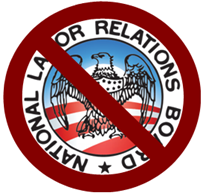
Through shortened election periods, the agency is limiting the time an employer has to communicate with his or her employees about the implications of unionizing the firm. That will increase the odds that unions win these representation elections to about 89 percent, a recent estimate by the Labor Relations Institute found.
It is just the latest salvo by the agency, established in the 1935 National Labor Relations Act.
The purpose of the board was to help facilitate the unionization of employers, with the agency acting as a supposedly “neutral” arbiter. In reality, Congress created an entity to act as prosecutor, judge, and jury in disputes against employers by labor unions.
These quasi-judicial proceedings have the same effect as a regulation, said Americans for Limited Government Foundation President Nathan Mehrens, an expert on the National Labor Relations Board.
“The NLRB regulates in one of two ways. It either writes new regulations, or it adjudicates cases between employers and unions,” Mehrens explained.
Recent power grabs by the board via the quasi-judicial proceedings have inspired Rep. Austin Scott (R-Ga.) and Sen. Mike Lee (R-Utah) to separately offer legislation that would remove all judicial powers from the agency, sending all disputes arising under U.S. labor law to federal courts.
Both Scott and Lee are anticipated to resubmit the legislation again, but with an additional feature. This time, Scott and Lee will also take away the agency’s powers to write regulations with the exception of mere internal rules governing the board’s functioning.
The addition is necessary, Mehrens said, to prevent the agency from getting around the prohibition on deciding cases by simply issuing more rulemakings like the quickie election rule.
In fact, depending on the composition of the political appointees of the Board — comprised of up to five members all chosen by the President, subject to Senate confirmation — individual decisions can favor either unions or employers.
Two decisions by the Board in 2011 — Lamons Gasket Co. and UGL-UNICCO Service Company — actually overturned decisions that were made when the Bush Administration was responsible for the agency’s composition. Those decisions in turn had overturned Johnson and Clinton Administration agency rulings, respectively.
Perhaps that is why 55 percent of respondents in a 2011 survey conducted by the polling company™, inc./WomanTrend on behalf of Americans for Limited Government thought it was a bad idea that the Board “is governed by five political appointees whose terms last four years.”
After all, the board’s rulemakings are quite inconsistent.
Under Rep. Scott and Sen. Lee’s proposed bills though, that would change. Federal courts would then be responsible for hearing these types of cases.
And it will be hard for the agency to issue contradictory rules every few years when its power to issue rules has been eviscerated. What’s not to like?
Robert Romano is the senior editor of Americans for Limited Government.






